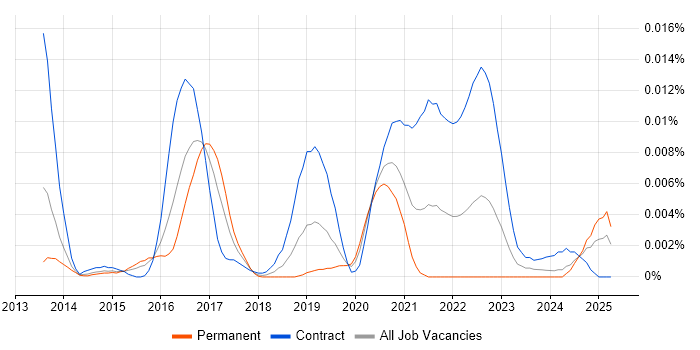JavaScript Object Notation for Linked Data (JSON-LD)
UK > England
The table below provides summary statistics for permanent job vacancies advertised in England requiring JSON-LD skills. It includes a benchmarking guide to the annual salaries offered in vacancies that cited JSON-LD over the 6 months leading up to 4 May 2025, comparing them to the same period in the previous two years.
| 6 months to 4 May 2025 |
Same period 2024 | Same period 2023 | |
|---|---|---|---|
| Rank | 659 | - | - |
| Rank change year-on-year | - | - | - |
| Permanent jobs citing JSON-LD | 2 | 0 | 0 |
| As % of all permanent jobs advertised in England | 0.004% | - | - |
| As % of the Libraries, Frameworks & Software Standards category | 0.026% | - | - |
| Number of salaries quoted | 1 | 0 | 0 |
| 10th Percentile | - | - | - |
| 25th Percentile | £105,000 | - | - |
| Median annual salary (50th Percentile) | £110,000 | - | - |
| 75th Percentile | £115,000 | - | - |
| 90th Percentile | - | - | - |
| UK median annual salary | £110,000 | - | - |
All Software Libraries and Frameworks
England
JSON-LD falls under the Software Libraries and Frameworks category. For comparison with the information above, the following table provides summary statistics for all permanent job vacancies requiring technical specification, industry standards, software libraries and framework skills in England.
| Permanent vacancies with a requirement for technical specification, industry standards, software libraries and framework skills | 7,642 | 17,422 | 27,671 |
| As % of all permanent jobs advertised in England | 16.43% | 20.42% | 29.95% |
| Number of salaries quoted | 5,811 | 14,133 | 17,121 |
| 10th Percentile | £38,750 | £36,250 | £41,250 |
| 25th Percentile | £51,250 | £45,651 | £51,250 |
| Median annual salary (50th Percentile) | £66,253 | £60,000 | £67,500 |
| Median % change year-on-year | +10.42% | -11.11% | +3.85% |
| 75th Percentile | £87,500 | £80,000 | £88,750 |
| 90th Percentile | £112,500 | £100,000 | £107,500 |
| UK median annual salary | £65,000 | £60,000 | £67,500 |
| % change year-on-year | +8.33% | -11.11% | +8.00% |
JSON-LD
Job Vacancy Trend in England
Job postings citing JSON-LD as a proportion of all IT jobs advertised in England.

JSON-LD
Salary Trend in England
3-month moving average salary quoted in jobs citing JSON-LD in England.
JSON-LD
Job Locations in England
The table below looks at the demand and provides a guide to the median salaries quoted in IT jobs citing JSON-LD within the England region over the 6 months to 4 May 2025. The 'Rank Change' column provides an indication of the change in demand within each location based on the same 6 month period last year.
| Location | Rank Change on Same Period Last Year |
Matching Permanent IT Job Ads |
Median Salary Past 6 Months |
Median Salary % Change on Same Period Last Year |
Live Jobs |
|---|---|---|---|---|---|
| London | - | 1 | - | - | |
| JSON-LD UK |
|||||
JSON-LD
Co-occurring Skills and Capabilities in England by Category
The follow tables expand on the table above by listing co-occurrences grouped by category. The same employment type, locality and period is covered with up to 20 co-occurrences shown in each of the following categories:
